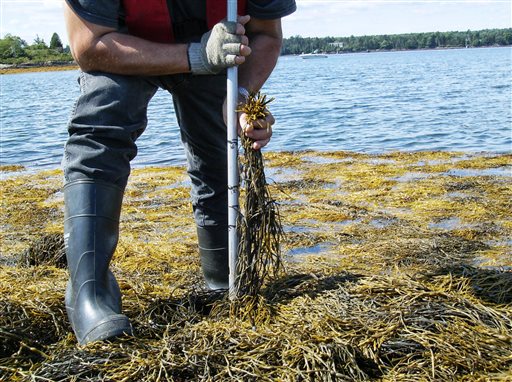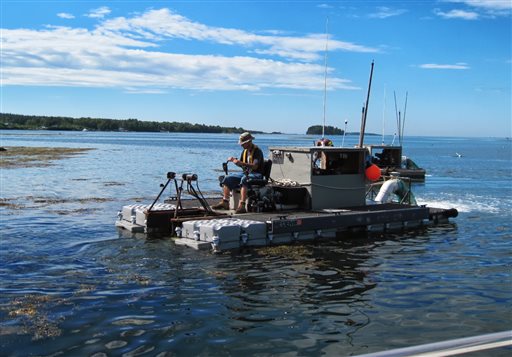PORTLAND — All it takes is a license and a cutting rake to harvest rockweed anytime and anywhere along most of Maine’s long coast. Other than in a large bay in far eastern Maine, there’s no fisheries management plan for the common seaweed that grows along the shore.
But work is now underway to develop a statewide plan to manage rockweed, which is processed in Maine into fertilizer, animal feed supplements, food and other products with an estimated value of $20 million a year.
A team tasked with developing the plan says rockweed isn’t being overharvested, but that it’s time to develop a strategy to establish sustainable harvesting guidelines and adopt harvesting practices to minimize habitat and ecosystem impacts as the industry grows. Rockweed landings in Maine have risen from less than 4 million pounds a decade ago to more than 15 million pounds in each of the past two years.
“Rockweed is becoming a much more important commercial species,” said Brian Beal, a marine ecology professor at the University of Maine-Machias and a member of the 13-person development team, which held its first meeting last week. “With increased levels of harvest, we want to make sure there’s a plan in place to ensure it’s sustainably harvested.”
Seaweed has been commercially harvested in Maine for decades, with rockweed accounting for more than 90 percent of the total seaweed harvest and kelp, dulse, nori and other kinds of algae making up the remaining 10 percent. Four major rockweed companies operate in Maine, buying raw product from locals who use mechanical harvesters or specially-designed, hand-held rakes.
Besides its commercial value, rockweed is important because it provides food, shelter and spawning habitat for a wide variety of animals and organisms including lobsters, mussels, snails, periwinkles and fish.
Yet for the most part, the industry is largely unregulated.
All harvesters have to be licensed and are required to cut rockweed at least 16 inches above where it holds onto rocks, to allow the plants to survive and regenerate. In Cobscook Bay — a sprawling body of ocean water tucked against the Canadian border in far eastern Maine — a management plan in place since 2009 divides the bay into 36 zones, caps the harvest at 17 percent of the biomass estimates and mandates that harvesters file harvest plans with the state.
The new statewide plan could incorporate a variation of some elements of the Cobscook Bay plan, said Dave Preston of North Atlantic Kelp in Waldoboro, which makes specialty fertilizer and animal feed supplements. It’s scheduled for delivery to the Legislature’s Marine Resources Committee in January and could be in effect a year from now.
There’s no evidence rockweed is being overharvested, said Preston, who’s serving on the plan’s development team. More than 2 billion pounds of it grow in the Gulf of Maine, with less than 1 percent harvested annually, according to the Department of Marine Resources.
But rockweed harvesting critics such as Robin Hadlock Seeley, a marine ecologist and an eastern Maine homeowner who co-founded the Rockweed Coalition, think harvesting should be banned in Maine until there’s scientific evidence that shows it’s ecologically sustainable and doesn’t affect other fisheries. Critics also want a court to determine whether rockweed is a public resource that’s legal to harvest.
She said most rockweed grows in intertidal zones, which are privately owned and which the public doesn’t have legal access to except for public trust rights including “fishing, fowling and navigation” under colonial law. But there’s never been a definitive court ruling on whether seaweed harvesting constitutes fishing, and hundreds of property owners in eastern Maine object to the harvest on their properties, she said.
More important, she said, rockweed is a vital part of the marine environment, but nobody fully knows how the harvest affects the ecosystem
“It’s absolutely essential,” she said. “It’s too important to risk since we don’t know how much you can take and still have a functioning intact ecosystem.”
But others say more rockweed is lost to nature each year — through storms, ice scouring, degradation and the like — than is taken by harvesters.
Studies also show that rockweed regenerates fairly quickly, in two to four years, said Linda Mercer, director of the Bureau of Marine Science of the Department of Marine Resources. So while cutting rockweed might have short-term effects on marine life that depend on it for shelter and food, she said, things pretty much return to normal once the rockweed grows back.
“It’s not like we’re clear-cutting,” she said.
Copyright 2013 The Associated Press.
Summary
Date:6/9/2013 11:17 AM
Slug:BC-ME–Rockweed Harvesting,1st Ld-Writethru
Headline:Maine developing plan to manage rockweed harvest
Source:AP
Byline: CLARKE CANFIELD,Associated Press
Byline Title:Associated Press
Copyright Holder:AP
Priority:r (4)
With Photo:
Dateline:PORTLAND, Maine
Editors’ Note:Eds: Updates with background on plan; quotes from critics, supporters; details of rockweed. With AP Photos.
Word Count:778
File Name (Transref):e0020
Editorial Type:Lead
AP Category:n
Format:bx
Send questions/comments to the editors.




Success. Please wait for the page to reload. If the page does not reload within 5 seconds, please refresh the page.
Enter your email and password to access comments.
Hi, to comment on stories you must . This profile is in addition to your subscription and website login.
Already have a commenting profile? .
Invalid username/password.
Please check your email to confirm and complete your registration.
Only subscribers are eligible to post comments. Please subscribe or login first for digital access. Here’s why.
Use the form below to reset your password. When you've submitted your account email, we will send an email with a reset code.